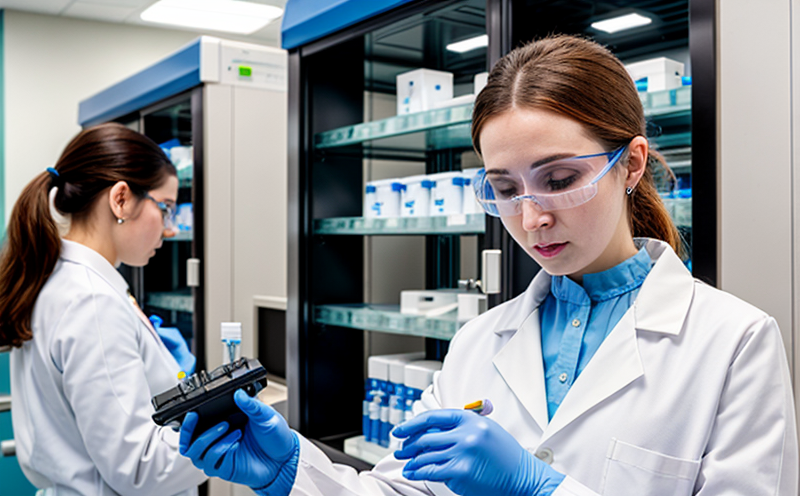Precision of Bioanalytical Method Testing
The precision of a bioanalytical method is a critical determinant in ensuring the reliability and reproducibility of pharmaceutical testing results. Precision refers to the degree to which repeated measurements under unchanged conditions show the same results. In the context of bioanalytical methods, it ensures that the analytical process can consistently reproduce its findings over multiple samplings from the same subject or sample.
Pharmaceutical companies rely heavily on precise bioanalytical testing for drug development, regulatory compliance, and quality assurance. The precision of these tests directly impacts the accuracy of pharmacokinetic studies, which are essential for understanding how a drug behaves in the body—how it is absorbed, distributed, metabolized, and excreted.
The precision of bioanalytical methods must meet stringent standards to ensure that they can reliably detect even small concentrations of active pharmaceutical ingredients (APIs) or biomarkers. This is particularly important for highly potent compounds where minute differences in concentration can lead to significant variations in therapeutic outcomes.
Our service focuses on validating the precision of bioanalytical methods used in the analysis of drugs and other biopharmaceutical products. We employ rigorous statistical techniques, such as replicate analyses, intra-assay variability calculations, and inter-assay reproducibility studies, to assess method precision comprehensively.
The following factors are key considerations when evaluating the precision of a bioanalytical method:
- Repeatability: The ability of the method to produce consistent results under identical conditions.
- Ruggedness: The robustness of the method against minor variations in experimental conditions.
- Stability: The duration over which samples can be analyzed without loss of analytical performance.
The precision of bioanalytical methods is particularly important for ensuring that drug concentrations are accurately measured, which is critical for safety and efficacy evaluations. Inaccurate measurements could lead to suboptimal dosing regimens or even adverse effects due to over- or under-dosing.
| Parameter | Description | Acceptance Criteria |
|---|---|---|
| Intra-assay Precision (Repeatability) | The variation in results when the same sample is analyzed multiple times under identical conditions. | <20% relative standard deviation (RSD). |
| Inter-assay Reproducibility | The variation in results obtained from different batches of samples analyzed on different days. | <15% RSD. |
| Ruggedness | The method's ability to withstand slight changes in conditions without significant impact on performance. | Acceptable variability within the expected range for the method. |
In summary, precision testing is an essential step in ensuring that bioanalytical methods are robust and reliable. Our service provides comprehensive analysis to meet industry standards and regulatory requirements, thereby enhancing confidence in pharmaceutical testing results.
Scope and Methodology
The scope of our precision testing for bioanalytical methods includes the evaluation of various aspects such as repeatability, ruggedness, and inter-assay reproducibility. This ensures that the method can consistently produce accurate results under a wide range of conditions.
- Repeatability: We conduct replicate analyses on a single sample to assess the precision within a run.
- Ruggedness: We introduce small variations in experimental parameters (e.g., temperature, reagent concentration) and measure how these affect the results.
- Inter-assay Reproducibility: Samples are analyzed across different batches on separate days to evaluate long-term stability and consistency.
The methodology we employ follows international standards such as ISO 17025 for laboratory accreditation, ICH Q2 (R1) for method validation, and ASTM E691-18 for statistical methods in testing and evaluation of materials and products. These guidelines ensure that our precision tests are conducted rigorously and consistently.
Our approach involves the following key steps:
- Selecting Samples: We use a representative sample set to reflect the variability expected in real-world conditions.
- Preparation: Each sample undergoes standardized preparation procedures to ensure uniformity.
- Analysis: The samples are analyzed using validated bioanalytical methods, and data is collected for statistical analysis.
- Data Analysis: We use statistical tools such as ANOVA (Analysis of Variance) to determine the precision metrics.
The results from these tests provide a comprehensive evaluation of the method's precision, ensuring that it meets the necessary standards for reliability and accuracy in pharmaceutical testing.
Why Choose This Test?
- Rigorous Validation: Our tests are based on international standards, ensuring robust validation of the bioanalytical method.
- Comprehensive Evaluation: We assess multiple aspects of precision to provide a thorough evaluation of the method's reliability.
- Industry Expertise: Our team comprises experts in pharmaceutical testing with extensive experience in bioanalytical methods.
- Regulatory Compliance: The results from our tests are compliant with regulatory requirements, enhancing confidence in your submissions.
- Cost-Effective: By ensuring that the method is precise, you avoid costly rework and delays in clinical trials or product launches.
- Scientific Rigor: We use advanced statistical methods to provide accurate and reliable precision data.
Precision testing for bioanalytical methods is essential for maintaining quality standards and ensuring regulatory compliance. By choosing our service, you can ensure that your analytical processes are robust and reliable, leading to more accurate drug development and manufacturing processes.
Customer Impact and Satisfaction
- Enhanced Confidence: Our clients benefit from increased confidence in the reliability of their bioanalytical methods, which is crucial for regulatory submissions.
- Reduced Risks: By ensuring that the method is precise, we help minimize the risks associated with inaccurate testing results.
- Cost Savings: Our services can reduce costs by identifying and correcting imprecise methods early in the development process.
- Achieving Compliance: Our tests ensure that your bioanalytical methods meet all necessary regulatory standards, streamlining the approval process.
- Better Decision-Making: Accurate precision data enables more informed decisions regarding drug efficacy and safety.
- Improved Reputation: By providing precise testing results, you enhance your reputation for quality and reliability in pharmaceutical research and development.
Our clients consistently report high levels of satisfaction with our services. We are proud to have supported numerous projects that have contributed to the successful development and approval of new pharmaceutical products.





